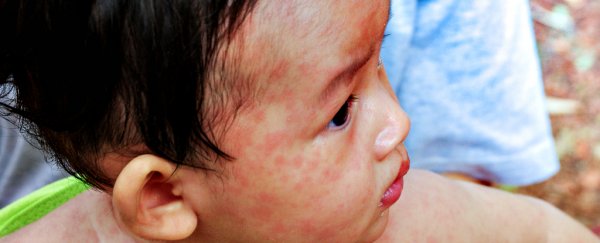More than 50 years since a vaccine became available, the World Health Organisation (WHO) has officially declared measles eliminated from the Americas - not just the US, but the land mass stretching from Canada to Chile, and all the countries in between.
It's the first region in the world to have rid itself of all local cases of the viral disease, and a pretty huge deal for public health.
"This is a historic day for our region and indeed the world," said Carissa Etienne, director of the Pan American Health Organisation, who made the announcement with the WHO.
"It is proof of the remarkable success that can be achieved when countries work together in solidarity towards a common goal."
Of course, even though the disease has been eliminated within the Americas, people can still catch the virus in the region - there have been 54 cases this year in the US alone - but these infections all originate overseas and are brought in by travellers.
The last home-grown outbreak in the Americas was Venezuela in 2002. The US was declared free of measles way back in 2000.
Unfortunately, eliminating a viral disease from one region doesn't mean we've eradicated it completely - that would be when an infectious disease has been removed from the entire planet.
To date, humans have only managed to successfully eradicate one disease from the planet. Thanks to the successful smallpox vaccine developed by Edward Jenner in 1796, the last case of smallpox was reported in 1977, and the disease was announced eradicated in 1980.
But we're getting very close to eradicating a second disease, too. Guinea worm disease, caused by the parasitic Guinea worm, now only exists in four countries, with its territory shrinking thanks to water filtration devices.
None of this news means we can get slack with vaccinating though. Measles has only been eliminated through something known as 'herd immunity' - which means that roughly 90 to 95 percent of a population is immunised against a disease, so random outbreaks won't be able to take hold.
That level of protection safeguards the small percentage of people who can't be vaccinated for health reasons, newborn babies, and those for whom vaccines aren't effective.
Once immunisation rates drop below that herd immunity level, though, we see imported outbreaks become more sustained, and the disease spreading within local populations again - which happened in 2014 in California.
And given the fact that measles is still widespread in many parts of the world, it's worth staying vigilant.
"I would like to emphasise that our work on this front is not yet done," said Etienne. "We cannot become complacent with this achievement but must rather protect it carefully."
So stay protected, and stay educated, but also take a minute if you're in the Americas to give yourself a pat on the back for helping to eliminate a viral disease that still kills more than 100,000 people around the world each year.
Hopefully, one day, we'll be able to announce that the disease is eradicated altogether. That'll be a really good day.
Update 30 September 2016: We updated to correct that the creator of the smallpox vaccine was Edward Jenner, not Jonas Salk.
